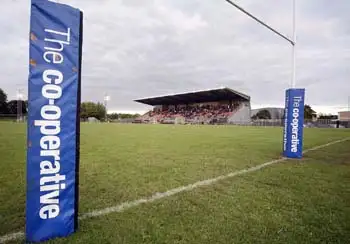Reasons to Love RL: London Skolars

Amidst all the artifical expansion and elevation of clubs around them, London Skolars remain an outpost club success.
They haven’t had it easy, and they’ve spent several seasons languishing at the bottom of the third tier, but their playing fortunes have been revitalised by former player and London Bronco Joe Mbu, now head coach.
Under Mbu’s leadership, the Skolars have managed to get themselves in to play-off contention this season, which bodes well for the new-look Championship 1 in 2013.
The origins of the club date back to 1995, when a group of ex-student players got together to form a team, based out of Hackney RU club.
They won the London League, Southern Cup and London Cup in their early years, before entering the National Conference League, and they were the first team to tour Russia, playing on snow in Tatarstan in 1999.
The club then acted as one of the pioneers of the Rugby League Conference, playing both winter and summer rugby, before in 2002 they became the first amateur club in 80 years to turn professional.
Director Hector McNeil said: “We did it as we felt the London Rugby fraternity could support a semi-pro side. The system was starting to develop quality players and it was far more likely that they could play Championship level rather than Super League.
“Also, London was full of quality Australian and Kiwi players. The problem is, in 2006, they scrapped the ability for the overseas players to play on working holiday visas and they really held us back. Now though, we are starting to get quality players coming through.”
With participation numbers and interest in the south enjoying an encouraging rise in the past decade, some of that progress must be attributed to the Skolars and the hard work they do.
While they aren’t a Super League club, the Skolars’ presence and work in the local community has encouraged the growth of rugby league.
McNeil added: “We have been involved significantly. We have always run junior sides and the club has given many players an outlet to play rugby league.
“Many of our former players have become movers and shakers in the game and industry, and clubs like St Albans, West Sussex Marlins, Wealdstone Warriors and many others have been formed with the input from ex-Skolars.
“All in all, I think we punch well above our weight.”
Despite the growth of the grass-roots and community game in the capital, there remains question marks over the viability of the Broncos’ Super League franchise, with crowds continuing to dwindle. But McNeil believes their presence is crucial.
He said: “It’s hugely important to the game here. They are a huge focus for the elite level of the game and I think they help to give rugby league credibility. Like ourselves, I think the game could give far more support in terms of PR, marketing, commercial etc.
“If you look at the Melbourne Storm example they are arguably the best team in the comp in recent times and they get way more resources proportionately than far more established clubs.”
The Skolars hold their own Super League ambition. McNeil points to the tradition of coach Mbu starting as a junior, working his way up through the professional ranks and then returning as coach, and points to the likes of Dylan Skee, Dave Williams, Ade Adebisi and Smokie Junor who have all come through the Skolars system in recent years.
They took Halifax all the way in a Northern Rail Cup tie earlier this year, and should be in with a reckoning of promotion next season if things continue.
But they are also keen to ensure any growth is “organic” – be that up to the Championship or beyond, Skolars are a club that aren’t going to stretch themselves beyond their means, and are a long-lasting club which is proudly flying the expansion flag.